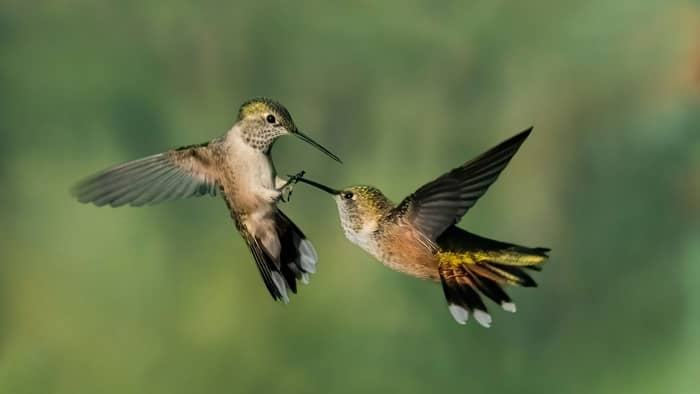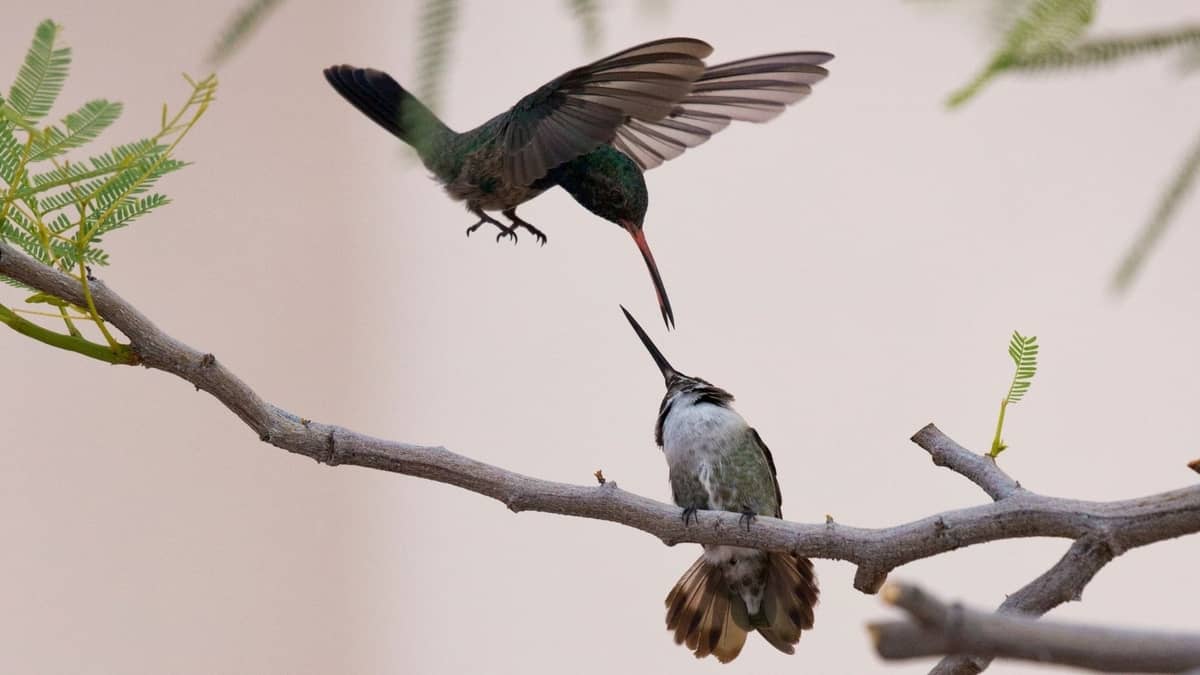Are hummingbirds aggressive as some people would say? This is a question that may have you wondering. Hummingbirds are no doubt very tiny and beautiful birds to watch. They are truly very aggressive, and rightly so for good reasons in most situations.
Hummingbirds make us understand that even small birds can have bad tempers, be angry, or just be selfish. So, when they begin to demonstrate these attributes, you notice some forms of aggression in their attitude.
Hummingbirds’ aggression may be displayed towards predators, other hummingbirds, or even humans. This article gives an explanation of why hummingbirds may show aggression sometimes and what to do if you notice this.
You need to understand how to deal with aggressive hummingbirds as a bird enthusiast. This is because it may become extremely difficult to feed your hummers peacefully when there is a constant interruption from a bully. This article offers a guide on what you may do also.
Since we now understand that hummingbirds are aggressive, let’s get into why they really demonstrate this aggression.
Why Are Hummingbirds Aggressive To Each Other?
The aggressive nature of hummingbirds is primarily because of the struggle for survival. The following are some specific reasons why they may be aggressive:
- Territorial Dominance: The male hummingbirds usually demonstrate aggression when declaring territorial command over a food source. It is thus very common to see male hummingbirds fighting over control of a feeder or around the nectar of a flower.
- In Defense of Breeding Territories: the female hummingbirds usually demonstrate aggression in most cases when they feel their breeding space is being encroached into. Aggression is mostly demonstrated after the females have laid their eggs.
- To fight off Predators: Another instance where you would like to notice hummingbirds’ aggression is when they are fighting off predators. Predators could be other bigger birds or other animals that may want to prey on them

Are Hummingbirds Aggressive Towards Humans?
You may have begun to worry whether the aggression of hummingbirds is demonstrated sometimes towards humans. It is important for you to know that hummingbirds usually will not intentionally try to hurt or be aggressive towards humans. They will rather be in flight than attempt to confront you.
There is however a tiny chance or situation where a hummingbird may be found to be aggressive towards you. This could be when the bird is threatened as if to be caught by you, or you walk into a territorial confrontation.
Considering the sharpness of their beaks and their sharp claws you may want to be careful around them.
Why Are Rufous Hummingbirds So Aggressive?
Amongst the different species of hummingbirds, the Rufous hummingbird has the worst tempers. They are usually most aggressive when defending their young ones and territory. You may want to be especially careful of them when they are demonstrating their aggression.
One major reason why the Rufous hummingbird is very aggressive is that they have a large migration path. What this means is that they have to cross a lot of territories every year. When they enter new territory, they have to secure a good habitat and food source, hence the aggression.

How Do Aggressive Hummingbirds Show Aggression?
There are different ways hummingbirds usually show aggression. Although they are small, they have a wide array of weapons they can use when they are angry. Some of the ways they show aggression include:
- Sounds: When you hear hummingbirds make loud, fast-paced chirping or buzzing sounds, then you should know they are demonstrating aggression. This is one way they wade off intruders into their territories. Such sound shows the intruder that the territory is occupied.
- Posture: a hummingbird that wishes to defend its territory may do some by showing off a threat posture. A male hummingbird may flare its gorget just to show off its many bright colors. Other aggressive postures include flaring the tail, raising feathers/wings, etc.
- Chase: this is one common way of defending a hummingbird’s territory. A dominant hummingbird or the one in control of territory may confront an intruder, often at the feeding area. This is usually followed by a sudden charge at them and pursuit from the feeder.
- Dives: when a hummingbird is faced with an intruder or predator, it may first hover in front of such an intruder to scare it. Where the intruder remains unmoved, it will then fly high above them and take a deep dive straight into the intruder. The dive is accompanied by a chirp.
- Fight: This is usually the last option resorted to when all of the above options have been futile. When fighting, hummingbirds use their needle-like bills and sharp talons as weapons. Hummingbirds can cause serious injury to each other or a predator when fighting.
Learn more about When Do Hummingbirds Leave Minnesota?
How Do You Stop An Aggressive Hummingbird: Reducing Hummingbird’s Aggression
From the above, you will notice that it is usually not a good thing to notice aggressive behavior by hummingbirds. This is more discouraging to watch when the aggression is demonstrated to other hummingbirds.
It may not be totally possible to stop hummingbirds’ aggression because this behavior is in their nature. However, there are things you can do to reduce it drastically.
·Feeder Spacing
When hummingbird feeders are sufficiently spaced apart, aggression is greatly reduced. Where there is sufficient space, the weak hummingbirds may easily sip some food before the bullies arrive.
·Increase the number of feeders
By buying more feeders and placing them in strategic positions, aggression is also reduced. Where too many birds are using a single feeder, it may cause friction and aggression among them.
·Plant nectar-producing flowers
Another way to reduce the aggression that may be noticed around feeders is to plant flowers that produce lots of nectar. By doing so, there is enough nectar available to go round for all the hummingbirds.
·Removing the cause of aggression
In some situations, aggression is caused by the presence of predators. Discovering this early enough and eliminating such predators also goes a long way to reduce aggression.

Are Hummingbirds Aggressive: Conclusion
From the above, you will notice that the beautiful hummingbirds may look small; however, they can also be very aggressive. This aggression can be for several reasons including primarily the defense of territory for food or breeding.
As a hummingbird bird lover, there are a few things you can do to discourage friction and aggression amongst hummingbirds. How to easily point out aggression from hummingbirds is also discussed. So, when next you notice aggression amongst hummingbirds, do make sure you do something to help.
[rank_math_rich_snippet id=”s-dc9d4a41-3790-48da-b812-88860e6a7263″]

